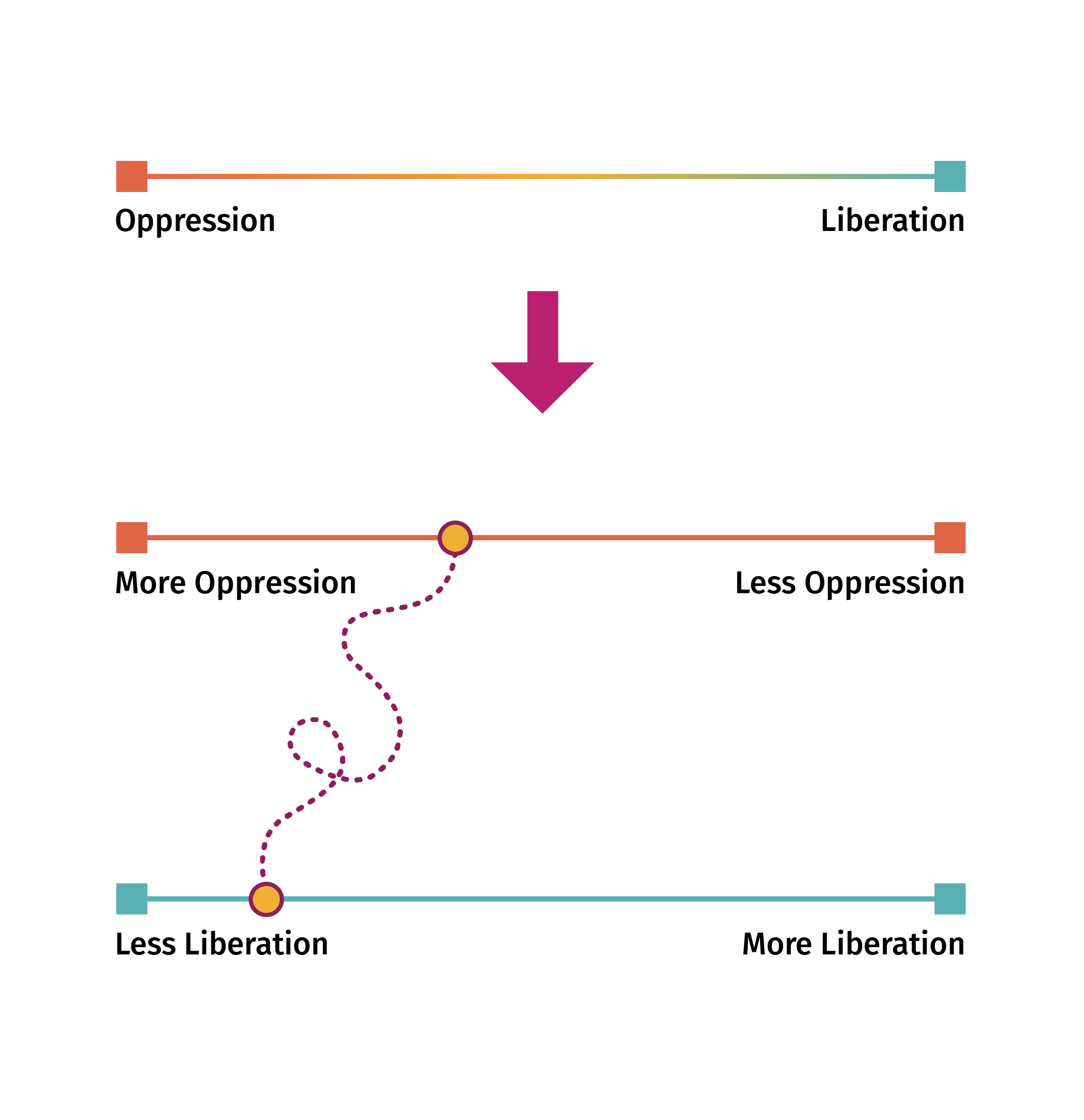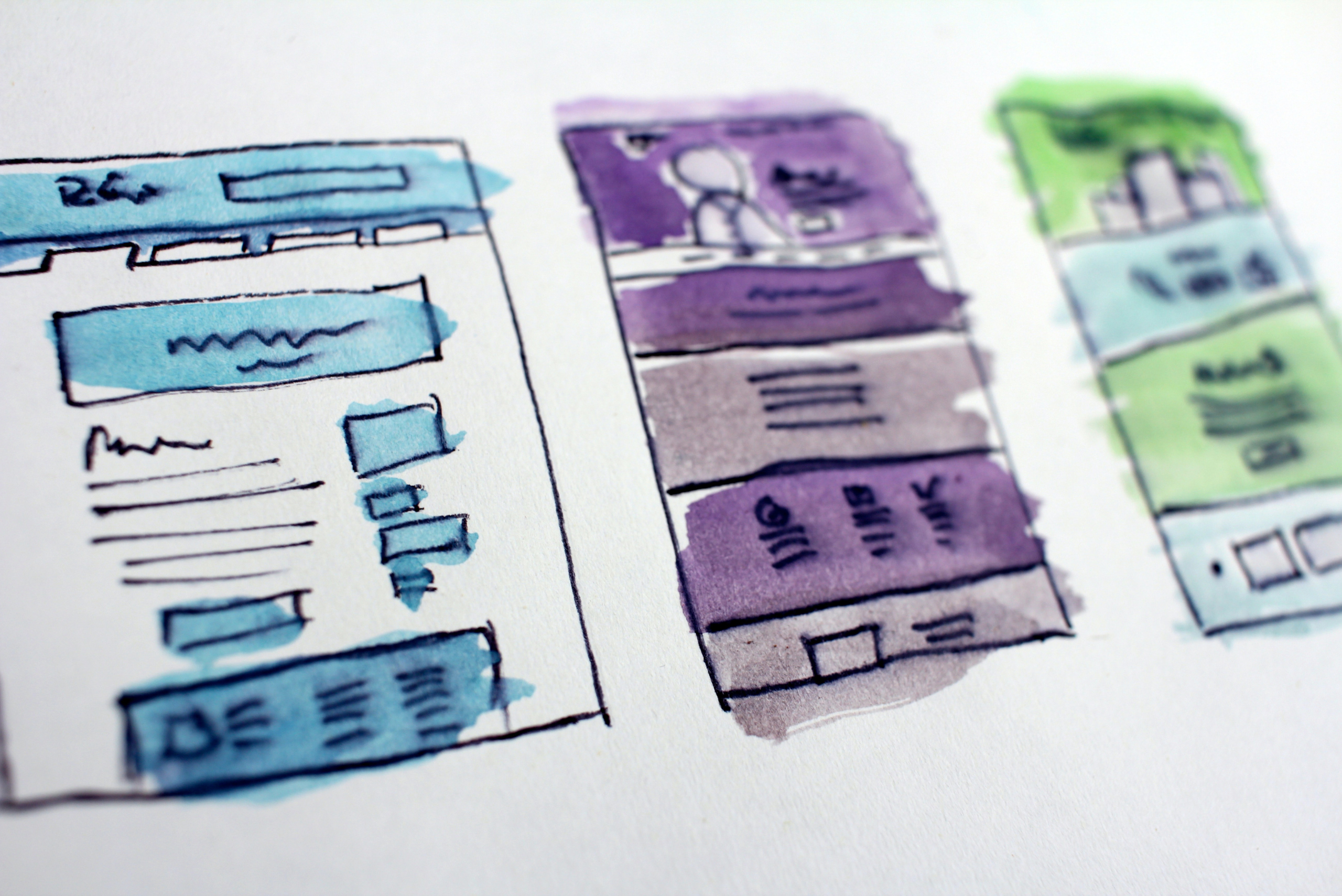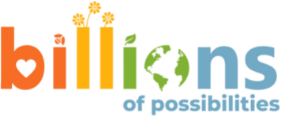Invitation
We intentionally put this module first on purpose. We don’t assume it will be “done” in one module; rather, that the questions that arise for you, for your organization, for your work, in this module, can be considered in parallel with the remainder of the work in this course. we don’t think it’s possible to do this work well without tending to the function and wellbeing of yourself and your team. So please give this the attention it deserves, and plan to return to what surfaces during this module throughout this course.
We usually think about this work – the work of anti-racism and equity more broadly – through a lens of reducing oppression. The assumption – usually unstated – is that reducing oppression leads to increased liberation. We do not see things linked in that way.
While there are things that we must dismantle, remove and reduce in our work in order to get ready to scale, we are going to be focusing on the things that need to improve through the mindset of not merely creating a workplace that is absent of white supremacy work culture (acknowledging its intersections with capitalism, class, gender, ableism and a litany of other isms and forms of oppression), but one that builds towards the liberatory work culture we all deserve.
We believe that a more liberatory, regenerative team culture is a necessary condition for designing solutions worth scaling and ultimately scaling those solutions. We hope these tasks kick-start your journey if you’re just beginning, or support you if you’re well on your way.
In this module, we’ll ask you to:
- Read Tema Okun’s piece and reflect on which elements of white supremacy culture are pervasive for you and in your organization.
- Explore the concept of Liberatory Consciousness and how you can continue to strengthen it.
- Take a meta view and reflect on how you may have benefited (or needed for survival) these behaviors – and how they may no longer be serving you.
- Explore and Identify which aspects of regenerative, liberatory culture you are most enthusiastic about embracing and designing into your team.
- Create a plan to take action!

Task # 1: Reflect on White Supremacy Culture
One of the most pervasive aspects of racism and inequity that allows for their maintenance is that they become “invisible.” This invisibility – through their normalization (that’s just the way things are done), codification (that’s just the policy, procedure, rule) and obfuscation (lack of language to identify and discuss it, conversations of intent vs impact, gaslighting). In order to make visible what’s been hidden, we need some support – something to point us in the general direction of where to look and a rough outline of what we’re trying to see. Tema’s pieces on white supremacy culture are excellent supports in that way.
Read Tema Okun’s just released updated version here. (and if you’re curious you can check out the original piece so you can see how it’s evolved!)
You can answer this reflection question in your handout.
Task #1 Reflection:
What aspects of white supremacy work culture does your organization perpetuate? What of the listed ways of working ring true for how your organization operates?
For a deeper dive – take a week to notice where white supremacy work culture behaviors showed up for you or others at work. We encourage you to use a separate notebook or journal to capture these reflections. We encourage you to carry the notebook with you, or keep it visible at your desk, so you can note things in the moment when possible.

Task # 2: Strengthen Your Liberatory Consciousness
The work of leadership is to help others see and understand what we want to change. To do so we must focus on strengthening our Liberatory Consciousness.
- Listen to a clip from The Heart of Daring Leadership (episode 1 season 1) minutes 13:05-21:08
- Read Developing a Liberatory Consciousness by Barbara J. Love in Readings for Diversity and Social Justice by Heather W. Hackman, Madeline L. Peters, Ximena Zuniga, 2000
Reflection (journal in your handout packet):
What has been your past experience engaging in conversations about Racism, Diversity, Equity and Inclusion? To what extent have you internalized the work of awareness, analysis, action, and accountability? How are you doing in each of those areas and what supports or actions on your part might strengthen your liberatory consciousness?

Task # 3: Understand What is at the Core of Why You Think and Work the Way You Do
We know that “the master’s tools will never dismantle the master’s house” (Audre Lorde), “that we can’t solve a problem with the same thinking that created it” (misattributed to Einstein, but we like the sentiment), and our take – that the process is the key to the product. If we want an equitable and liberated reality – we need to think, act, organize and (re)design in equitable and liberated ways. And if we are getting oppressive and inequitable results, you better believe it’s because the ways we’re thinking and working are oppressive and inequitable.
In order to make a shift, we must understand what is at the core of why we think and work the way we do. To be clear – often times these approaches have served us in some way (even if at the same time they have harmed us). Let’s dig into this.
- Read Code-Switching Is Not Trying to Fit in to White Culture, It’s Surviving It by Ida Harris
Reflection:
Reflect on how white supremacy work culture behaviors may have served you in the past and how, upon further reflection, with a deeper commitment to liberation, they might no longer be of service to you.
What are we going to keep and what are we getting rid of? (For example, deadlines can be helpful when they aren’t being used to weaponize a false sense of urgency).
What is helping you? What is harming you? What is about survival?

TASK # 4: Identify What You Are Moving Toward
We need to know what we are actively trying to dismantle, what the “problems” are, but we also need to know what we’re replacing it with. Without this second piece – a clear vision of where we’re going that isn’t solely the absence of what was there before – our work is incomplete. Without it, as we have seen so often, harmful things just come right back in a different way.
- Read Qualities of Regenerative and Liberatory Culture By Daniel Lim
Reflection:
When it comes to the way you work and your organizational culture, what elements of WSC are you interested in dismantling? What are the elements of a regenerative, liberatory culture you want to design into being?

Task # 5: Identify Areas to Dismantle Oppression and Design for Liberation
Take some time to identify a few areas that you want to intentionally design out of and into your work culture. Meet with your team and create a plan to take some action.
Use this spreadsheet:

Meta Reflection on Reflections
Starting in module 2, at the end of each module, we will offer you an opportunity to reflect on what you’ve learned. This is intended to be done as an individual versus with your team. You will find the reflection prompts in your handout packet with ample space to journal. We hope this will deepen your learning!
